Legislators In Catalonia Push Measure For Independence From Spain
Legislators in Spain's Catalonia region took a step toward independence, but Madrid apparently wants nothing to do with it.
Legislators in Spain’s Catalonia region took another step forward in a long-standing bid for independence from Spain, but it’s unclear whether it will amount to anything:
BARCELONA — Catalan separatist lawmakers intensified their standoff with Spain’s central government in Madrid on Monday, approving a resolution that lays out a path for the region to “disconnect” from the rest of Spain by creating its own institutions, including a separate Catalan tax agency and social security system.
The move was immediately denounced by Spain’s prime minister, Mariano Rajoy, as the latest evidence that Catalan separatists were willing to flout Spanish law in their pursuit of independence.
In response, Mr. Rajoy said he would sign a decree to suspend all the declaration’s possible consequences, pending a ruling by Spain’s Constitutional Court that is expected to strike down Catalonia’s resolution, the latest in a series of steps to break away from Spain that have escalated over the last three years.
“Catalonia is not going to disconnect from anywhere, and there is going to be no breakup,” Mr. Rajoy said.
The standoff over the future of Catalonia — which accounts for a fifth of Spain’s economy — has become increasingly tense as both sides have raised the stakes in each round of the confrontation, and as both Mr. Rajoy and the head of Catalonia’s regional government, Artur Mas, have used the conflict to bolster their own standing in the face of political challenges.
Mr. Rajoy has sought to present himself as the defender of Spanish unity ahead of a general election on Dec. 20. The vote is unlikely to yield a clear-cut winner, according to the most recent opinion polls, with Mr. Rajoy and his Popular Party holding a small lead that would be insufficient to keep their parliamentary majority.
Mr. Mas, too, is fighting for political survival. He and his Convergence Party have been tainted by corruption scandals, and Mr. Mas is supposed to face a vote on his leadership of Catalonia by Thursday. Yet he is struggling to garner sufficient support from lawmakers. One separatist party that voted in favor of the resolution opposes his re-election.
Addressing the Catalan Parliament on Monday, Mr. Mas called on fellow separatists to unite in the “gigantic” challenge of forming a new nation.
“We have the opportunity to create a new country,” Mr. Mas said. Catalonia, he argued, has reached a crossroads, facing a choice between “subordination and freedom.”
The resolution approved on Monday calls for Catalonia to become an independent republic, a goal that Mr. Mas and other separatists aim to achieve within 18 months. Most controversially, the resolution includes a defiant claim that Catalonia’s march toward nationhood need not be subject to approval by Spanish institutions or the country’s Constitutional Court.
More from The Wall Street Journal:
Regional lawmakers in Catalonia approved a resolution to move toward independence from Spain, saying they would no longer be bound by the central government’s edicts and setting up a test of wills with the prime minister.
The proposal to begin a “democratic disconnection” from Spanish institutions passed 72-63 in the Catalan parliament on Monday after a two-hour debate.
Spanish Prime Minister Mariano Rajoy, who has said Catalonia’s separatist push represents the country’s major challenge ahead of Dec. 20 national elections, pledged to use all of the authority of his office to stop it.
“I understand the anxiety that many Catalans can feel, but to all of them I say you can rest easy,” Mr. Rajoy said. “Catalonia isn’t separating from anywhere, nor will there be any rupture.”
Mr. Rajoy said his government would petition Spain’s Constitutional Court this week to have the resolution declared void. Legal experts say the court would almost certainly bar Catalonia from taking any steps to put it into effect.
That could result in a political standoff, as the resolution singles out the Constitutional Court—which has blocked the wealthy industrial region’s previous attempts to gain more autonomy—as being “delegitimized and without authority.”
Mr. Rajoy’s center-right government has been preparing new judicial measures to deploy against the separatists. In October, without support of major opposition parties, it passed a law that allows for tough sanctions, including fines and suspension from holding office, against public officials who defy Constitutional Court rulings.
Despite the strong rhetoric in the resolution, Catalan separatists are hindered by internal divisions as they try to agree on a regional president following elections in September.
The largest pro-independence bloc supports re-electing the current Catalan leader, Artur Mas, but he faces fierce opposition from a small, far-left secessionist party that finds itself in an unlikely role as kingmaker.
The split in the separatists’ camp becomes more embarrassing the longer it drags on and could eventually hamper their legislative agenda.
The nine-point resolution calls on Catalonia’s parliament to start within 30 days to prepare laws to create independent social security and tax authorities. Pro-independence parties have said they hope to complete the separation process within 18 months.
(…)
Support for independence in Catalonia began to move into the mainstream after the Constitutional Court in 2010 struck down key provisions of a regional autonomy agreement that had been approved by Catalan voters and the national and Catalan legislatures.
Catalan separatists complain that Madrid drains the region of taxes without respecting its distinctive culture. Madrid says that Catalonia has benefited from the union, and is being led astray by Mr. Mas and a corrupt governing elite.
Separatist leaders cast the September regional election as a plebiscite on secession. The secessionist slates won a narrow parliamentary majority, but just under 48% of the popular vote.
The Catalan government says the only thing that might stop the independence pushwould be an agreement by the central government to allow a binding referendum on independence of the sort Scotland held last year with the blessing of the U.K. government. Mr. Rajoy says such a referendum would be unconstitutional, and rejects it out of hand.
The idea of Catalan independence is one that goes back many decades, but it seems to have gained more prominence in recent years thanks, at least in part to developments in other parts of Europe. The separation of Czechoslovakia into the Czech Republic and Slovakia in a completely peaceful manner, for example, seems to have been inspiration for many nasceant European separatist movements, as was the breakup of the Soviet Union before that. More recently, the rise of nationalism in Scotland, as evidence both by the referendum last year where voters didn’t approve Scottish independence but came awfully close to doing so, along with the electoral triumph of the Scottish National Party in the British elections in May to the extent that they control nearly all of Scotland’s seats in Parliament in addition to having control of the Scottish government, also seems to be spurring Catalans and others in their own efforts for independence, or at least greater autonomy. It was just a year ago, in fact, shortly after the nationalist’s loss in the Scottish referendum, Rajoy vowed to push forward with independence notwithstanding the results in Scotland and notwithstanding the fact that the central government in Madrid has made clear that it has no intention of following in the footsteps of British Prime Minister David Cameron and allowing any kind of referendum on Catalan independence, In addition to what seems to be a rather obvious attempt by Rajoy to shore up his own support amid competition from other pro-independence parties, this would seem to be the next step down that road.
Not being an expert on either Spanish politics or Catalan independence, I’m loathe to hazard many comments about what’s going on here, but a few observations do come to mind. The most prominent one is that these types of situations seem to be the kind where something akin to the Federalism that we have in the United States would be a possible solution. The United Kingdom has followed this path to some extent by providing Scotland, Northern Ireland, and Wales with the authority to make their own laws to some extent through their own Parliaments. England itself, though, does not have political authority separate from that of Parliament and that has often raised issues about why M.P.’s from other parts of the U.K. should be permitted to vote on issues that only impact England. Additionally, the Scottish National Party’s loss last year in the referendum seems likely to only temporarily quiet the push for greater autonomy or independence. Law Professor Ilya Somin has written recently about the idea of increased federalism in the United Kingdom as a solution to these conflicts. Spain also has something akin to the autonomy that exists the United Kingdom, and as this vote demonstrates Catalonia has its own legislature that has at least some authority to govern Catalan affairs free from interference from Madrid. Perhaps greater autonomy would be a solution to the pressures there, as a step below independence that still preserves the idea of a united Spain, Whatever the outcome, though, it’s likely that this is just another development that seems like its building toward something that could pose some interesting questions for the future of the United Kingdom, Spain, and perhaps other parts of Europe as well.
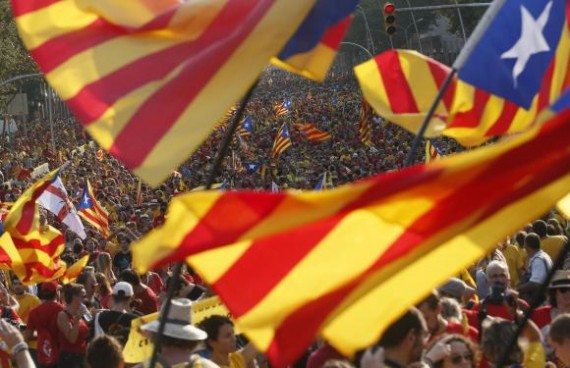

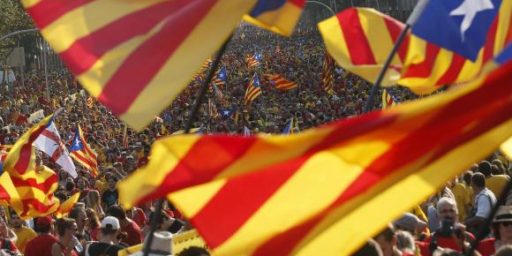
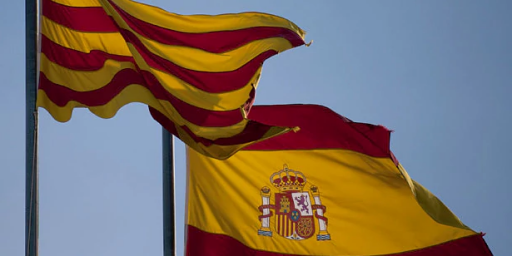
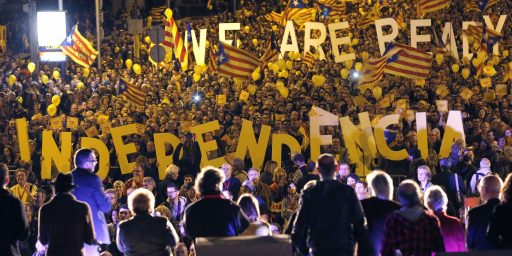
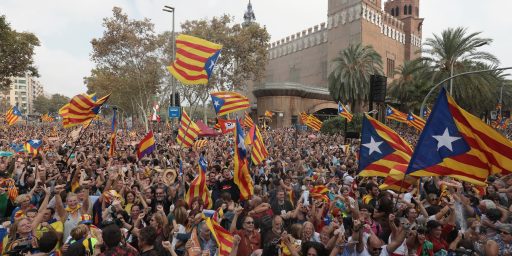
It is my understanding (albeit from an ocean away, so take it for what it is worth) that Catalonia is currently more successful economically than Spain as a whole, which no doubt is playing a part in this particular battle.
Yes, about 37 decades https://en.wikipedia.org/wiki/Catalan_Revolt
I believe Catalonia is also more politically liberal than Spain as a whole. But despite eating ham and drinking wine in Barcelona, I know very little about the country.
The current country known as Spain was one of those artificial creations largely created by the Moors. After being outlawed for several decades the Catalonian language is also making a big comeback. It is being taught in schools and there are Catalonian TV and radio stations as well as newspapers and magazines. My question is will the area of southern France that was part of the historical Catalonia also want to leave France and join Catalonia at some point.
@Ron Beasley: Doubt it, because southern France would also want to go back to Languedoc (also called Occitan.)
I wonder how close Occitan and Catalonian are? Hmm…
@Ron Beasley:
Only in the reverse sense, it was the fight against the moors that united Spain during the reconquista starting from Castille and Aragon.
@Gromitt Gunn: That is in fact the main resentment. As the article says, Catalonia is responsible for one fifth of Spain’s economy. Catalans feel they are supporting the rest of Spain. (their population equals 1/6 of Spain’s so I think they are stretching it a little) My wife is from Spain (the island of Mallorca) and she says Catalans in general are just bigger a-holes than most other Spaniards. My own limited experience w/ Catalans says she is probably right.
@grumpy realist: The languages are very similar and of the same language group.
FTFY
As was noted above, you’ve got the wrong end of the stick. The idea that Catalunya is just a part of Spain — the idea of “Spanish unity” — is the recent innovation.
Castile is an arid pile of not much in the middle of the Iberian peninsula. In order to have anything at all, they conquered their much more prosperous, cosmopolitan, resource-rich and diverse neighbors in Aragon, Andalusia, Catalunya, Galicia, the Basque country, etc. Then (as @Mu notes) they invented the idea of “Spanish unity” as a propaganda campaign to counter the endless attempts at secession (or outright revolt) by their client states, using the Moors (and then the Jews, and then the Protestants, and then Communism…) as the external threat to justify unity.
I’ve never met a native of non-Castile Spain who thinks of themself as a Spaniard. It’s hardly surprising that, in the context of the EU, those non-Spaniards would like to assert their non-Spanishness.
The Euskadi and Catalunya regions of Spain are in many respects independent cultures within Spain. They each have a language that is not Spanish, and rich literary and arts cultures.
Also, politically, since the 1937 Civil War, both regions and cultures have been openly alienated from Madrid. Picasso’s Guernika tells you all you need to know about the alienation of Euskadi (the Basque people) from Madrid. Also, Catalunyans feel that their economic success is exploited by Madrid, that they do not benefit sufficiently from their economic efforts, their wealth.
Sounds like quite a few of the countries of Europe are “artificial creations” that now want to break apart..When you begin to talk about the break up of countries like Spain and France who have been united for 500 years, then what of Germany and Italy, who were united less than 150 years ago? I dunno, this might be a dangerous path…
OTOH, it does lead you to take another look at the difficulties of some African and Middle East countries in managing their own nationalism. Many Westerners tend to look down their long noses at those countries, wondering why can’t they “get it together” in a few decades. Apparently, nation building is hard and even 500 years may not be enough.
No worries about Germany, that was always a “one people, many states” type situation. Italy has a noticeable separatist movement in the north, but it’s more based on economics than on some true nationality feeling.
@stonetools:
France has been under a single rule for a long time, but French national identity was the (deliberate) creation of Napoleon, who worked long and hard to stamp out regional loyalties. He deliberately drew new Department boundaries that split up and recombined traditional duchies like Gascony and Burgundy, and suppressed regional languages (like Breton and Basque) and dialects (Picard, Normand, Limousin, Gascon, and others).
We discussed Spain above. Like France, it has been under one rule for a lot longer than it has been “united”, in the sense that people from every region think of themselves as ‘Spanish’ (except at World Cup time).